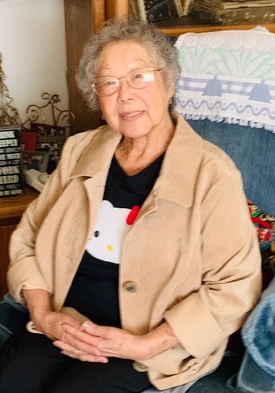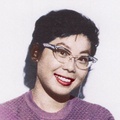What is that story?
He didn't have any papers, so I guess he got on the ship. But he worked on the ship, so he might have learned to cook there, too. But when he got here, you know how they quarantine you for many days, many weeks? At that time, he escaped and came to Washington. It was in February and it was so cold to swim that water, from the boat to Washington. So that's how he came in. It docked some place in Washington but several miles away. But because he lived on the island, he was a good swimmer. He could swim for miles.
That must have been really difficult, though.
Yes. And then he would never tell us that story because he was kind of ashamed that he had to come across with no papers. But that's what my brother, when he went to Japan, heard from the Shimono side; that he would write to them and how cold it was.
That's a pretty amazing story of just survival and using every skill you have.
As young as you are to come. It's important that he survives and continue on.
So you stayed the remainder of the time in Amache. When did your family end up leaving?
I believe 1945. That's when the war was over? It wasn't over quite yet. We left around Fourth of July.
So you went back to Sacramento and what did you do?
That same Chinese man? That's who we went to see first. He gave us soda. That was such a big treat. And then he gave us the key and we went to our home, our hotel.
Wow. And all of your things were kept there?
Yes. Nothing was touched but because Charlie, that was his name, didn't stay there either, he got himself another place but paid the rent. But because nobody stayed there for several months, we had bats. The bats finally left. I don't know when, but that was scary.
Did you feel life resume back to normal or did it change in some way after you came home?
You know, before we left, we were like little kids. When you go into camp, you got to grow up. You're aware of other things besides yourself. And you're nobody.
Do you feel like that matured you?
And when you got out, you were 11 or 12?
Did you ever come to realize the racial discrimination that was going on against Japanese and Japanese Americans?
The neighborhood we came back to was mostly the same. If they were anything but Japanese, they knew us. Like the barber shop that was downstairs, they knew us. We didn't see any change in it. But across the street used to be a Japanese drugstore that was run by a Filipino man. And he was the only one that didn't serve us ice cream. He wouldn't serve us. I guess he was angry with us.
You mentioned that your parents came from Hiroshima and your mother's family had relatives there during the war?
Well, my mother's sister.
Were they affected by the bombing?
Not them, because they seem to have done all right. And the other family did alright, too. My father's side, so they were doing all right. It's my husband's family that was affected by the bomb. They were in another area. So the sisters, Tosh's, that's my husband's aunties, they were blinded by the atomic bomb.
How old were they?
Well, they might have been 40, 50. There was a lamp post that they grabbed on to, and then all that happened.
Very sad.
We don't know anything about that family because well, that's their family. They didn't say too much about that.
How did you meet your husband?
Well, like I said, this is all Japanese area, right? So everybody knew each other. He was different. Everybody else, we knew each other but my husband, he went to Japan when he was six and came back when he was about 13 or 14.
So he was Kibei.
Yes. He might have been older because he came back when he was about maybe he came back about 14. So he might have been maybe nine.
When did he come back?
Maybe a couple of years before the war started.
So when did you actually meet him? How old were you?
Well in Sacramento everybody knows this family and that family, and he was Kibei. It's amazing I married him [laughs]. Who looks at a Kibei anyway? [laughs] But it just so happened.
[Mas]: When'd you start going with him?
And what was he doing as a job?
Well, he was in the service and because he knew radio. He worked inNew Mexico, worked with electrical things, and so he probably knew about the aliens, all that area. He was really interested in aliens. When we came to Lancaster, they also talked about alien things there.
He didn't go overseas in the Korean War, where all the guys in Sacramento went to Korea. He just stayed in New Mexico with all the people that did his type of work. But then after Korean War he went to college as a mathematician at Sacramento State College.
So you had gotten married after that?
Well, he got his degree, so it was okay to get married.
How many children did you have?
And where was your husband in camp?
Same place. Well, he was in another block in Tule Lake. He stayed the whole time.
Mas mentioned to me that he passed away young, when was that?
Oh yes, he was 51.
What happened?
[Mas]: Did they misdiagnose him or this hospital didn't do something, right? They didn't give him that medicine?
No, we went to see him then he died.
And did he die suddenly?
Well, you would say, like from November, he wasn't feeling well, and then this January 4th, he died.
So then you basically had to raise all your children, some nearing their adulthood, but you still had young kids. How was that experience for you? Did you have support from the family?
Well, living in Lancaster, no support. My mother stayed for a few months, but that day that my husband died, all my kids were Christians, not baptized yet. My husband was a Christian, I was a Buddhist. But that night, somehow the Christian religion about Jesus became kind of clear to me, and I became a Christian that night. Overnight. And so by Easter, we all were baptized that year. And I've been a Christian ever since. Because I became a Christian, I had all that help from God. It was alright.
You found some strength in that.
Right. I used to think Christians were weaklings. You know, Buddhists think they're the best. And they were, until I realized the Bible is so important.
What do you hope that your grandchildren and your great grandchildren and people in your family, who may not be able to ask you in person, what do you hope that they remember or know of the experience that your family went through during the war? Is there something that you hope that they know and remember about this time?
Well, the hardest thing is, this should never happen again. And that when somebody starts any kind of life, it's a start and you keep growing and you grow and grow and grow. But for us to have gone to camp, we went back how many times? There was that depression in between there, and so we're not where we should be. We went back. So we're behind the Chinese because the Chinese stayed on, and other people. Everyone should be treated equally and the right way, like you two are working to make it a better world, to teach us how things work and how it can be. So what you're doing is good.
[Mas]: When you were headed into camp, you said your dad was almost about to buy a house, right?
Yes, by that time my father was at his top. So the restaurant, the Bay Restaurant, he had three restaurants before that. And this Bay Restaurant was really a nice restaurant. And so it was just about the time we were going to buy a house and a $10,000 house. And he showed it to us after we came out of camp. I thought, my goodness, at that time to have [a house], that was good. But we went to camp. So whatever few money that he had, they had to put it away.
[Mas]: They put it away, but then they used the money to buy the restaurant?
Right. So when all this happened, they had to make money to start again, but they had a little put away some place. So when they got out, 1945, they went to work at a restaurant for a while, both of them, and so with what they saved they looked around for another restaurant and was able to put all that money into that new another restaurant. So he knew how to start it because he had so many restaurants that he knew how business started. So he helped other people start businesses after they got out, those that he knew.
[Mas]: I didn't know that, that's cool.
He had some good friends that he helped. Like one of the uncles he helped. So he loved my brother. That's the uncle that liked him.
And how long did they have that restaurant?
Until 1965. When Sacramento started to rebuild, buying out the houses.
So was your family bought out by developers?
Yes. But by that time, my father was ready to retire.
Were your parents alive long enough to receive their redress?
My mother was, but not my father.
When did your father pass away?
About 1968, something like that. Just soon after closing.
When did your mother pass away?
2003 or 2004.
When you received your redress and the apology, what was your feeling?
Well, I appreciated it, but I didn't want to say too much because I was working and everybody else would think, "Oh, you're so lucky you got that." When you're working, they think you're so lucky. So I didn't think too much about it but I was kind of angry that my husband was not able to get it.
One of the things that made me laugh about camp was one day I was talking to my daughter. You know how some kids go to camp? And then my daughter Edith says to me, "You were lucky, Mom. You went to camp. I never got to go to camp." So we never talked bad about camp, I suppose. She never got to go to camp.
Did you explain to her? Did you talk about it at all?
Well at that time, we told her about the camp. It wasn't the kind of camp she's talking about.
Right. This is not summer camp.
Well, they know about camp but we didn't have such a bad experience about camp, so we don't talk about it. We didn't talk about sad times because it's bad enough for the grownups, they might have thought how bad it could be for the kids. Like right now, with those immigrants, I don't think — if I was ever separated from my parents, I don't know if I could have survived.
*This article was originally published in Tessaku on December 13, 2022.
© 2022 Emiko Tsuchida







